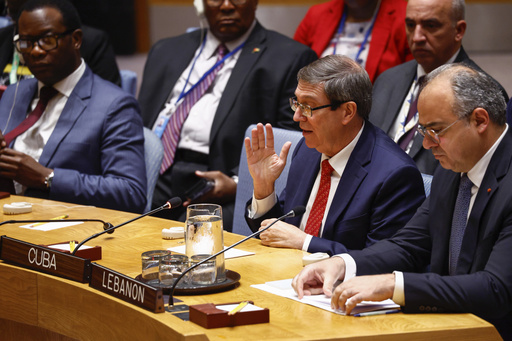
In a significant move on Wednesday, the United Nations General Assembly cast a decisive vote denouncing the United States’ economic embargo on Cuba for the 32nd consecutive year. The resolution received strong backing, with 187 member states in favor, while only the U.S. and Israel opposed it, and one member abstained. This level of support matches the record set in 2019 and again in 2022.
Cuban Foreign Minister Bruno Rodriguez delivered a strong critique of the Biden administration during the assembly, expressing optimism that a new president might choose to lift the embargo. He attributed the ongoing economic hardships in Cuba, including a widespread blackout this month made more severe by Hurricane Oscar, to the U.S. government’s “maximum pressure policy,” which he argued aims to disable Cuba’s access to essential fuel imports. Rodriguez questioned the sincerity of U.S. claims that its policies are designed to support the Cuban population.
While General Assembly resolutions do not hold legal power, they capture international sentiment, illustrating the U.S.’s isolation in its longstanding efforts against Cuba. The Caribbean nation is grappling with severe economic difficulties, marked by energy crises, food shortages, and inflation, which have spurred mass migration, with many attempting to reach the U.S.
The origins of the embargo trace back to 1960, following Fidel Castro’s revolution and the nationalization of American-owned properties. After a two-year period, the embargo was tightened significantly. Relations between Cuba and the U.S. saw a thaw in July 2016 when then-President Raul Castro and Barack Obama took steps toward reconciliation. That year marked the first instance of the U.S. abstaining from a resolution calling for the embargo’s end. However, this shift was reversed under President Donald Trump, who criticized Cuba’s human rights situation, leading to a consistent U.S. opposition to the resolution post-2017.
Speaking on behalf of the U.S. delegation, Deputy Ambassador Paul Folmsbee reaffirmed the nation’s commitment to advocating for the Cuban people’s rights and future. He positioned sanctions as part of a broader strategy to encourage democracy and human rights within Cuba, highlighting the detainment of around 1,000 political prisoners as a point of concern. Folmsbee emphasized that U.S. sanctions exempt vital products like food and medicine, noting that last year, the U.S. exported nearly $336 million in agricultural goods to Cuba and approved additional humanitarian exports.
In a recent development, the U.S. eased some financial restrictions aimed at stimulating private enterprise within Cuba, allowing independent entrepreneurs access to U.S. bank accounts online and facilitating internet services to enhance business operations.
Rodriguez rebutted the purported effectiveness of these measures, declaring that Cuba has incurred losses exceeding $16 billion under the current U.S. administration. With the upcoming U.S. presidential election on the horizon, he asserted that the incoming leader would face a choice: continue the longstanding “inhumane siege” or listen to both the growing sentiment among many Americans and the clear majority of global nations advocating for Cuba’s development.
Finally, Rodriguez affirmed Cuba’s right to establish a “socialist future” independently while expressing openness to fostering constructive relations with a new U.S. administration.
